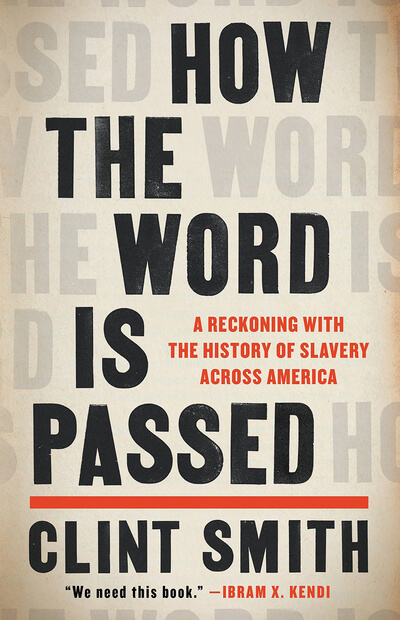Clint Smith, whose spellbinding How the Word Is Passed: A Reckoning With the History of Slavery Across America is a must-read, grew up in New Orleans. He remembers frequently passing the city’s Robert E. Lee monument, riding along Jefferson Davis Parkway and attending a middle school named for Robert Mills Lusher, another leader of the Confederacy.
Speaking by phone from Washington, D.C., Smith tells me that when his hometown removed Confederate statues and memorials in 2017, he began wondering, “What does it mean that I grew up in a city, a majority Black city, in which there were more homages to enslavers than there were to enslaved people? How does that happen, and what does the process of reckoning with that look like?”
ALSO IN BOOKPAGE: Read our starred review of How the Word Is Passed.
By that moment in 2017, Smith had given up his lifelong quest to become a professional soccer player (he was good but not quite good enough) and turned to literature, writing and performing slam poetry “just as obsessively as 15-year-old me stayed up until 3 a.m. watching second division [soccer] teams from the Netherlands on cable TV.” He had also published an award-winning book of poetry and taught high school English, and he assumed he would teach for the next 30 years. “I loved talking about literature with teenagers,” he says.
But Smith’s teaching experiences had raised larger questions about the role of education in our society. He began reading widely about the philosophy and practice of education by writers who were “thinking about using the classroom to help students understand that the world is a social construction,” he says. “It can be deconstructed and reconstructed into something new. The essence of that is that you don’t have to accept the world as an inevitability. It can be transformed.”
Pursuing this interest further, Smith entered a multidisciplinary Ph.D. program at Harvard. During graduate school, he freelanced for The New Yorker, the New Republic and the Atlantic (where he’s now a staff writer) as a way to distill the history and theory he was learning in the classroom into a more approachable format.
“You don’t have to accept the world as an inevitability. It can be transformed.”
After New Orleans removed its Confederate statues in 2017, Smith began writing a series of daily poems to explore issues around “growing up surrounded by Confederate iconography,” he says. He eventually decided the subject needed something lengthier and wrote two prose chapters, but he was unsatisfied with the results. Then a visit to Monticello, Thomas Jefferson’s Virginia home, which Smith details in the brilliantly prismatic first chapter of his book, presented him with the format for How the Word Is Passed: Talk to people. Respectfully, interestedly. And do enough research to contextualize their stories and delineate the difference between history and nostalgia.
“When I went to Monticello in the summer of 2018, I had never done a lot of reporting,” Smith says. “I’m not someone who walks up to strangers and asks them questions. That’s not a part of my natural ethos. But I did that at Monticello, and it transformed what I hoped the book could do. My own ideas about what these people and places meant had to be in conversation with what these people and places meant to other people.”
Some visitors he talked to were astonished, sometimes disheartened, to learn of the moral inconsistencies of Jefferson, the author of the Declaration of Independence, who, like so many of the Founding Fathers, owned enslaved people. Recent scholarship has revealed that Jefferson fathered children with enslaved women, most notably Sally Hemings, and kept his children enslaved. In fact, Smith found his book’s title in the oral history of Hemings’ descendants.
“Slavery existed for a hundred years longer in this country than it has not existed. We forget that sometimes.”
In recent years, Monticello has made an effort to tell the stories of the people Jefferson owned alongside the story of Jefferson himself. But not all the historical sites of enslavement that Smith visited for his book—Louisiana’s Angola State Prison, Blandford Cemetery for Confederate veterans in Virginia, the African Burial Ground in New York City, the House of Slaves on Gorée Island in Senegal and others—probe their complicated histories as much as Monticello does. Smith’s fascinating, nuanced book illuminates this struggle to acknowledge and reckon with these histories on both individual and societal levels.
“My grandfather’s grandfather was enslaved,” Smith says. “My grandmother’s grandfather was born right after emancipation. The history that we tell ourselves was a long time ago wasn’t in fact that long ago. Slavery existed for a hundred years longer in this country than it has not existed. We forget that sometimes. We forget how much it shaped this country. We forget the extent to which that past is still with us.”
Author photo credit © Carletta Girma





